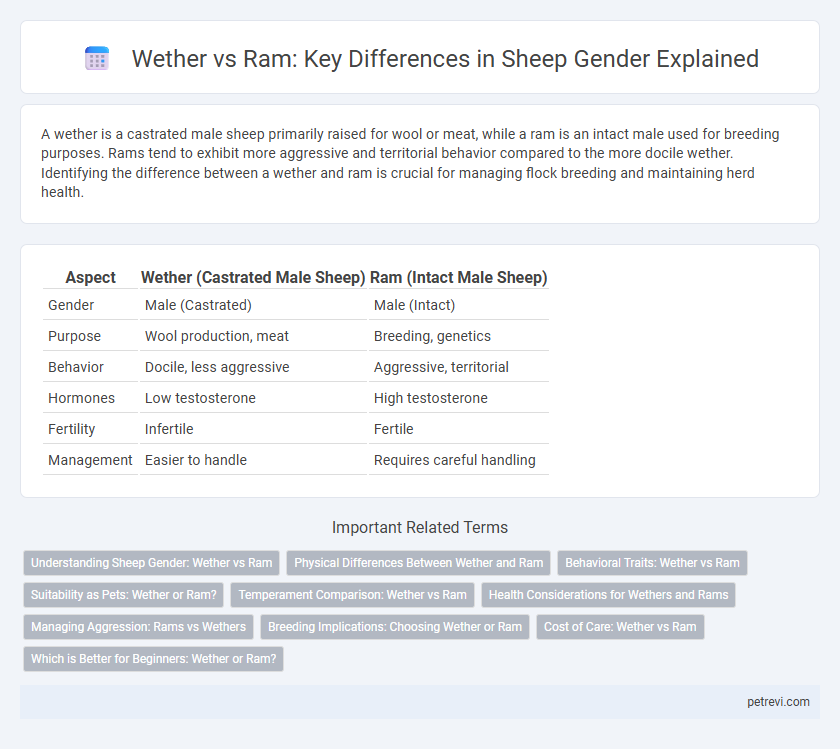A wether is a castrated male sheep primarily raised for wool or meat, while a ram is an intact male used for breeding purposes. Rams tend to exhibit more aggressive and territorial behavior compared to the more docile wether. Identifying the difference between a wether and ram is crucial for managing flock breeding and maintaining herd health.
Table of Comparison
| Aspect | Wether (Castrated Male Sheep) | Ram (Intact Male Sheep) |
|---|---|---|
| Gender | Male (Castrated) | Male (Intact) |
| Purpose | Wool production, meat | Breeding, genetics |
| Behavior | Docile, less aggressive | Aggressive, territorial |
| Hormones | Low testosterone | High testosterone |
| Fertility | Infertile | Fertile |
| Management | Easier to handle | Requires careful handling |
Understanding Sheep Gender: Wether vs Ram
A wether is a castrated male sheep primarily raised for wool or meat, while a ram is an intact male sheep used for breeding purposes. Identifying sheep gender accurately involves noting that rams exhibit distinct secondary sexual characteristics like larger horns and more aggressive behavior, whereas wethers lack these traits due to castration. Understanding these differences is crucial for sheep management, breeding decisions, and flock composition optimization.
Physical Differences Between Wether and Ram
Wethers are castrated male sheep, typically smaller and less muscular than rams due to the absence of testosterone, which influences physical development. Rams exhibit larger, thicker necks and more prominent horns or horn buds, alongside a bulkier frame and more pronounced shoulder muscles. Wethers generally have a calmer demeanor, reflected in less aggressive body posture and reduced secondary sexual characteristics compared to rams.
Behavioral Traits: Wether vs Ram
Wethers, castrated male sheep, exhibit calmer and more docile behavior compared to rams, making them easier to manage in flock settings. Rams display strong territorial and aggressive traits, especially during breeding season, often leading to dominance displays and fighting. Understanding these behavioral differences helps optimize handling practices and ensures safer, more efficient flock management.
Suitability as Pets: Wether or Ram?
Wethers, being castrated male sheep, are generally more suitable as pets due to their calmer temperament and reduced aggression compared to rams. Rams retain their natural territorial and mating behaviors, which can lead to unpredictable and potentially dangerous interactions. Choosing a wether ensures a more docile and manageable companion animal for a household or small farm environment.
Temperament Comparison: Wether vs Ram
Wethers, castrated male sheep, generally exhibit calmer and more docile temperaments compared to rams, which often display aggressive and territorial behaviors, especially during the breeding season. Rams tend to be more dominant and can be unpredictable, requiring careful handling, while wethers are preferred for their steady and manageable nature in flock management. Understanding these temperament differences is crucial for farmers to ensure safe and efficient sheep husbandry practices.
Health Considerations for Wethers and Rams
Wethers are castrated male sheep, which reduces aggressive behavior and lowers the risk of certain reproductive diseases compared to rams. Rams retain their reproductive organs, making them more prone to injuries, infections, and stress during mating seasons. Managing the health of wethers involves monitoring weight and hoof care, while rams require regular reproductive examinations to prevent diseases and maintain fertility.
Managing Aggression: Rams vs Wethers
Rams typically exhibit higher levels of aggression compared to wethers due to their intact hormone levels, making management more challenging during breeding seasons. Wethers, being castrated males, generally display calmer behavior and are easier to handle, reducing risks of injury to handlers and other sheep. Effective flock management often involves housing rams separately and monitoring their interactions, while wethers can be integrated more smoothly into mixed groups.
Breeding Implications: Choosing Wether or Ram
A ram is an intact male sheep essential for breeding, passing on desirable genetic traits and ensuring flock improvement through reproduction. Wethers, being castrated males, lack breeding capability and are primarily used for meat production or wool, presenting no genetic contribution to the flock. Selecting a ram supports controlled breeding programs and genetic diversity, while wethers serve roles unrelated to reproduction.
Cost of Care: Wether vs Ram
Wethers, castrated male sheep, generally require less intensive care and lower feeding costs compared to rams due to reduced aggression and territorial behavior, which minimizes injuries and stress. Rams demand more management efforts, including separate housing and more frequent health monitoring, increasing overall maintenance expenses. Choosing wethers over rams can result in significant cost savings in large-scale sheep farming operations focused on low-cost upkeep.
Which is Better for Beginners: Wether or Ram?
Wethers, castrated male sheep, are generally better for beginners due to their calmer temperament and ease of handling compared to rams, which are intact males and can display aggressive and territorial behavior. Rams require experienced management to prevent injury and maintain control during breeding seasons, making them less suitable for novice shepherds. For beginners prioritizing manageable and safe livestock, wethers provide a practical option without the complexities associated with rams.
Wether vs Ram for Sheep Gender Infographic

 petrevi.com
petrevi.com